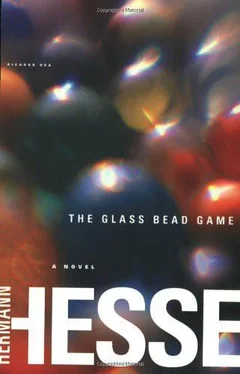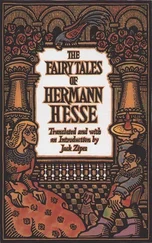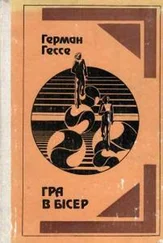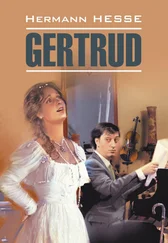These latter are the heroes, and in the case of these truly exemplary men, interest in the individual, in the name, face, and gesture, seems to us permissible and natural. For we do not regard even the perfect hierarchy, the most harmonious organization, as a machine put together out of lifeless units that count for nothing in themselves, but as a living body, formed of parts and animated by organs which possess their own nature and freedom. Every one of them shares in the miracle of life. In this sense, then, we have endeavored to obtain information on the life of Joseph Knecht, Master of the Glass Bead Game, and especially to collect everything written by himself. We have, moreover, obtained several manuscripts we consider worth reading.
What we have to say about Knecht’s personality and life is surely familiar in whole or in part to a good many members of the Order, especially the Glass Bead Game players, and for this reason among others our book is not addressed to this circle alone, but is intended to appeal more widely to sympathetic readers.
For the narrower circle, our book would need neither introduction nor commentary. But since we also wish our hero’s life and writings to be studied outside the Order, we are confronted with the somewhat difficult task of prefacing our book with a brief popular introduction, for that less-prepared reader, into the meaning and history of the Glass Bead Game. We stress that this introduction is intended only for popular consumption and makes no claim whatsoever to clarifying the questions being discussed within the Order itself on the problems and history of the Game. The time for an objective account of that subject is still far in the future.
Let no one, therefore, expect from us a complete history and theory of the Glass Bead Game. Even authors of higher rank and competence than ourself would not be capable of providing that at the present time. That task must remain reserved to later ages, if the sources and the intellectual prerequisites for the task have not previously been lost. Still less is our essay intended as a textbook of the Glass Bead Game; indeed, no such thing will ever be written. The only way to learn the rules of this Game of games is to take the usual prescribed course, which requires many years; and none of the initiates could ever possibly have any interest in making these rules easier to learn.
These rules, the sign language and grammar of the Game, constitute a kind of highly developed secret language drawing upon several sciences and arts, but especially mathematics and music (and/or musicology), and capable of expressing and establishing interrelationships between the content and conclusions of nearly all scholarly disciplines. The Glass Bead Game is thus a mode of playing with the total contents and values of our culture; it plays with them as, say, in the great age of the arts a painter might have played with the colors on his palette. All the insights, noble thoughts, and works of art that the human race has produced in its creative eras, all that subsequent periods of scholarly study have reduced to concepts and converted into intellectual property — on all this immense body of intellectual values the Glass Bead Game player plays like the organist on an organ. And this organ has attained an almost unimaginable perfection; its manuals and pedals range over the entire intellectual cosmos; its stops are almost beyond number. Theoretically this instrument is capable of reproducing in the Game the entire intellectual content of the universe. These manuals, pedals, and stops are now fixed. Changes in their number and order, and attempts at perfecting them, are actually no longer feasible except in theory. Any enrichment of the language of the Game by addition of new contents is subject to the strictest conceivable control by the directorate of the Game. On the other hand, within this fixed structure, or to abide by our image, within the complicated mechanism of this giant organ, a whole universe of possibilities and combinations is available to the individual player. For even two out of a thousand stringently played games to resemble each other more than superficially is hardly possible. Even if it should so happen that two players by chance were to choose precisely the same small assortment of themes for the content of their Game, these two Games could present an entirely different appearance and run an entirely different course, depending on the qualities of mind, character, mood, and virtuosity of the players.
How far back the historian wishes to place the origins and antecedents of the Glass Bead Game is, ultimately, a matter of his personal choice. For like every great idea it has no real beginning; rather, it has always been, at least the idea of it. We find it foreshadowed, as a dim anticipation and hope, in a good many earlier ages. There are hints of it in Pythagoras, for example, and then among Hellenistic Gnostic circles in the late period of classical civilization. We find it equally among the ancient Chinese, then again at the several pinnacles of Arabic-Moorish culture; and the path of its prehistory leads on through Scholasticism and Humanism to the academies of mathematicians of the seventeenth and eighteenth centuries and on to the Romantic philosophies and the runes of Novalis’s hallucinatory visions. This same eternal idea, which for us has been embodied in the Glass Bead Game, has underlain every movement of Mind toward the ideal goal of a universitas litterarum, every Platonic academy, every league of an intellectual elite, every rapprochement between the exact and the more liberal disciplines, every effort toward reconciliation between science and art or science and religion. Men like Abelard, Leibniz, and Hegel unquestionably were familiar with the dream of capturing the universe of the intellect in concentric systems, and pairing the living beauty of thought and art with the magical expressiveness of the exact sciences. In that age in which music and mathematics almost simultaneously attained classical heights, approaches and cross-fertilizations between the two disciplines occurred frequently. And two centuries earlier we find in Nicholas of Cues sentences of the same tenor, such as this: “The mind adapts itself to potentiality in order to measure everything in the mode of potentiality, and to absolute necessity in order to measure everything in the mode of unity and simplicity as God does, and to the necessity of nexus in order to measure everything with respect to its peculiar nature; finally, it adapts itself to determinate potentiality in order to measure everything with respect to its existence. But furthermore the mind also measures symbolically, by comparison, as when it employs numerals and geometric figures and equates other things with them.”
Incidentally, this is not the only one of Nicholas’s ideas that almost seems to suggest our Glass Bead Game, or corresponds to and springs from a similar branch of the imagination as the play of thought which occurs in the Game. Many similar echoes can be found in his writings. His pleasure in mathematics also, and his delight and skill in using constructions and axioms of Euclidean geometry as similes to clarify theological and philosophical concepts, likewise appear to be very close to the mentality of the Game. At times even his peculiar Latin (abounding in words of his own coinage, whose meaning, however, was perfectly plain to any Latin scholar) calls to mind the improvisatory agility of the Game’s language.
As the epigraph of our treatise may already have suggested, Albertus Secundus deserves an equal place among the ancestors of the Glass Bead Game. And we suspect, although we cannot prove this by citations, that the idea of the Game also dominated the minds of those learned musicians of the sixteenth, seventeenth, and eighteenth centuries who based their musical compositions on mathematical speculations. Here and there in the ancient literatures we encounter legends of wise and mysterious games that were conceived and played by scholars, monks, or the courtiers of cultured princes. These might take the form of chess games in which the pieces and squares had secret meanings in addition to their usual functions. And of course everyone has heard those fables and legends from the formative years of all civilizations which ascribe to music powers far greater than those of any mere art: the capacity to control men and nations. These accounts make of music a kind of secret regent, or a lawbook for men and their governments. From the most ancient days of China to the myths of the Greeks we find the concept of an ideal, heavenly life for men under the hegemony of music. The Glass Bead Game is intimately bound up with this cult of music (“in eternal transmutations the secret power of song greets us here below,” says Novalis).
Читать дальше












